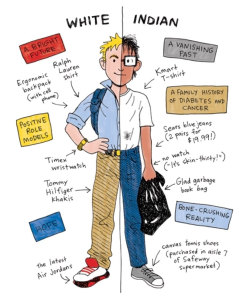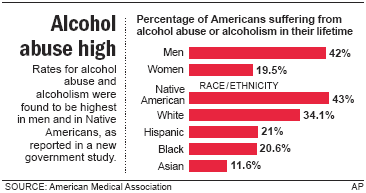The Absolutely True Diary

The Absolutely True Diary of a Part Time Indian tells the story of a fourteen-year old boy named Junior that lives on an Indian reserve in Washington. After getting in trouble at school for acting out over the age of the textbooks he was being given, he transferred to a school that is off the reserve. With the new schools comes a large culture shock; the students all seem to have money, their families ties are different than this own, and the way others behave does not always align with how he was raised. The story continues to share the story of his year at this new school and how it affects not only Junior, but his relationship with the reserve he came from.
Two strong themes were apparent in the novel: self-identity and alcoholism. Self-identity is how we define ourselves, referencing such themes as gender, academic performance, socio-economic status, and sexuality, among other factors. In Junior’s case, there were additional factors that played into his formation of an identity. Firstly, he had a number of medical deficiencies resulting from being born with hydrocephalus. Secondly, he was the only Indian student in a predominately white school. This caused him to internally battle with the juxtaposition of his two different personas: Indian at home and white at school.

Forming a solid self-identity is difficult for any young adolescent, nonetheless a teen in Junior’s position. As teachers, we must ensure that we serve as a pivotal role model to our students during this period in their lives. We must ensure that we create an emotionally safe environment for all students. Themes of respect and inclusion will help to diminish hateful acts, which will allow the students to feel safe in their exploration of creating a self-identity.
The second theme that stood out to me in this novel is that of alcoholism. Junior loses many family members to the effects of alcohol, which is a serious issue on Indian reserves:

There are a variety of reasons why alcoholism is heavily present on Indian reserves (poverty, history, etc.). No matter what the reason might be, it is important that this issue be addressed, even at young ages. Although alcohol and substance abuse education is one thing that can be done, there is a lot that can be done in the field of positive psychology and coping methods to reduce these statistics. By teaching students that there are ways other than alcohol to solve their problems, we can work towards creating a safer and better prepared generation on the reserves.
Really interesting response Spencer!
I agree with you Spence, but it is important to remember that problems such as substance abuse is the result of intergenerational impacts of the Indian Residential School System. Alcoholism is definitely a major issue, but there is also so many other important aspect of First Nation culture that we should consider and focus our attention on. Regardless, as always your post is very enlightening 🙂
Very interesting Spencer. Sort of following what Brooke notes, an elder who came in to speak to the I/S group for schooling in society at Rideau and spoke of how it was only through learning his First Nation culture and practicing it that he was able to give up drinking. Now he is able to help others learn the culture and experience the positive impact it can have on their lives. Interestingly though getting back to your original point. there were many connections between what the Elder spoke about and and positive psychology.